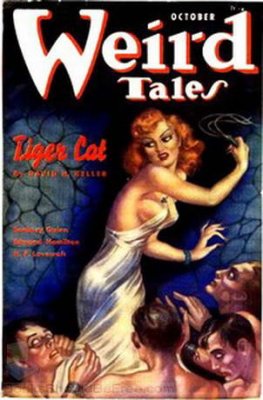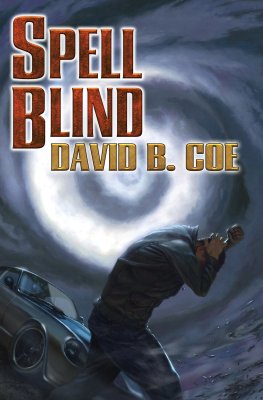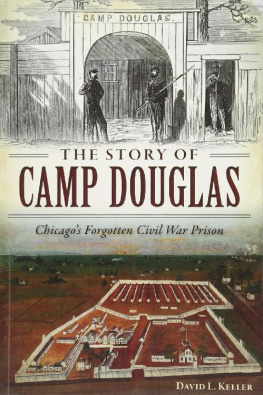David Keller - Tiger Cat
Here you can read online David Keller - Tiger Cat full text of the book (entire story) in english for free. Download pdf and epub, get meaning, cover and reviews about this ebook. year: 1937, genre: Science fiction. Description of the work, (preface) as well as reviews are available. Best literature library LitArk.com created for fans of good reading and offers a wide selection of genres:
Romance novel
Science fiction
Adventure
Detective
Science
History
Home and family
Prose
Art
Politics
Computer
Non-fiction
Religion
Business
Children
Humor
Choose a favorite category and find really read worthwhile books. Enjoy immersion in the world of imagination, feel the emotions of the characters or learn something new for yourself, make an fascinating discovery.
- Book:Tiger Cat
- Author:
- Genre:
- Year:1937
- Rating:3 / 5
- Favourites:Add to favourites
- Your mark:
- 60
- 1
- 2
- 3
- 4
- 5
Tiger Cat: summary, description and annotation
We offer to read an annotation, description, summary or preface (depends on what the author of the book "Tiger Cat" wrote himself). If you haven't found the necessary information about the book — write in the comments, we will try to find it.
Tiger Cat — read online for free the complete book (whole text) full work
Below is the text of the book, divided by pages. System saving the place of the last page read, allows you to conveniently read the book "Tiger Cat" online for free, without having to search again every time where you left off. Put a bookmark, and you can go to the page where you finished reading at any time.
Font size:
Interval:
Bookmark:
Tiger Cat
by David H. Keller
A grim tale of torture, and the blind men who were chained to pillars in an underground cave
The man tried his best to sell me the house. He was confident that I would like it. Repeatedly he called my attention to the view.
There was something in what he said about the view. The villa on the top of a mountain commanded a vision of the valley, vine-clad and cottage-studded. It was an irregular bowl of green, dotted with stone houses which were whitewashed to almost painful brilliancy.
The valley was three and a third miles at its greatest width. Standing at the front door of the house, an expert marksman with telescopic sight could have placed a rifle bullet in each of the white marks of cottages. They nestled like little pearls amid a sea of green grape-vines.
"A wonderful view, Signor," the real-estate agent repeated. "That scene, at any time of the year, is worth twice what I am asking for the villa."
"But I can see all this without buying," I argued.
"Not without trespassing."
"But the place is old. It has no running water."
"Wrong!" and he smiled expansively, showing a row of gold-filled teeth. "Listen."
We were silent.
There came to us the sound of bubbling water. Turning, I traced the sound. I found a marble Cupid spurting water in a most peculiar way into a wall basin. I smiled and commented.
"There is one like that in Brussels and another in Madrid. But this is very fine. However, I referred to running water in a modern bathroom."
"But why bathe when you can sit here and enjoy the view?"
He was impossible. So, I wrote a check, took his bill of sale and became the owner of a mountain, topped by a stone house that seemed to be half ruin. But he did not know, and I did not tell him that I considered the fountain alone worth the price that I had paid. In fact, I had come to Italy to buy that fountain if I could; buy it and take it back to America with me. I knew all about that curious piece of marble. George Seabrook had written to me about it. Just one letter, and then he had gone on, goodness knows where. George was like that, always on the move. Now I owned the fountain and was already planning where I should place it in my New York home. Certainly not in the rose garden.
I sat down on a marble bench and looked down on the valley. The real-estate man was right. It was a delicate, delicious piece of scenery. The surrounding mountains were high enough to throw a constant shadow on some part of the valley except at high noon. There was no sign of life, but I was sure that the vineyards were alive with husband-men and their families. An eagle floated serenely on the upper air currents, automatically adjusting himself to their constant changing.
Stretching myself, I gave one look at my car and then walked into the house.
In the kitchen two peasants sat, an old man and an old woman. They rose as I entered.
"Who are you?" I asked in English.
They simply smiled and waved their hands. I repeated my question in Italian.
"We serve," the man replied.
"Serve whom?"
"Whoever is the master."
"Have you been here long?"
"We have always been here. It is our home."
His statement amused me, and I commented, "The masters come and go, but you remain?"
"It seems so."
"Many masters?"
"Alas! yes. They come and go. Nice young men, like you, but they do not stay. They buy and look at the view, and eat with us a few days and then they are gone."
"And then the villa is sold again?"
The man shrugged. "How should we know? We simply serve."
"Then prepare me my dinner. And serve it outside, under the grapevine, where I can see the view."
The woman started to obey. The man came nearer.
"Shall I carry your bags to the bedroom?"
"Yes. And I will go with you and unpack."
He took me to a room on the second floor. There was a bed there and a very old chest of drawers. The floor, everything about the room was spotlessly clean. The walls had been freshly whitewashed. Their smooth whiteness suggested wonderful possibilities for despoliation, the drawing of a picture, the writing of a poem, the careless writhing autograph that caused my relatives so much despair.
"Have all the masters slept here?" I asked carelessly.
"All."
"Was there one by the name of George Seabrook?"
"I think so. But they come and go. I am old and forget."
"And all these masters, none of them ever wrote on the walls?"
"Of a certainty. All wrote with pencil what they desired to write. Who should say they should not? For did not the villa belong to them while they were here? But always we prepared for the new master, and made the walls clean and beautiful again."
"You were always sure that there would be a new master?"
"Certainly. Someone must pay us our wages."
I gravely placed a gold piece in his itching palm, asking, "What did they write on the walls?"
He looked at me with old, unblinking eyes. Owl eyes! That is what they were, and he slowly said,
"Each wrote or drew as his fancy led him, for they were the masters and could do as they wished."
"But what were the words?"
"I cannot speak English, or read it."
Evidently, the man was not going to talk. To me the entire situation was most interesting. Same servants, same villa, many masters. They came and bought and wrote on the wall and left, and then my real-estate friend sold the house again. A fine racket!
Downstairs, outdoors, under the grapevine, eating a good Italian meal, looking at the wonderful view, I came to laugh at my suspicions. I ate spaghetti, olives, dark bread and wine. Silence hung heavily over the sullen sleepy afternoon. The sky became copper-colored. It was about to rain. The old man came and showed me a place to put my car, a recess in the wall of the house, open at one end, but sheltered from the weather. The stone floor was black with grease; more than one automobile had been kept there.
"Other cars have been here," I ventured.
"All the masters had cars," the old man replied.
Back on the stone gallery I waited for the storm to break. At last it came in a solid wall of gray wetness across the valley. Nearer and nearer it came till it deluged my villa and drove me inside.
The woman was lighting candles. I took one from her hand.
"I want to look through the house," I explained.
She made no protest; so I started exploring the first floor. One room was evidently the sleeping-quarters for the servants; another was the kitchen, and the remaining two might have served in the old days for dining-room and drawing-room. There was little furniture, and the walls were gray with time and mold. One flight of stone stairs led upward to the bedroom, another to the cellar. I decided to go downstairs.
They were steps, not made of masonry, but apparently carved out of the living rock. The cellar was simply a cubical hole in the mountain. It all looked very old. I had the uneasy feeling that originally that cellar had been a tomb and that later the house had been built over it. But, once at the bottom, there was nothing to indicate a sepulcher. A few small casks of wine, some junk, odds of rope and rusty iron, those were in the corners; otherwise, the room was empty, and dusty.
"It is an odd room," I commented to myself. It seemed in some way out of place and out of shape and size for the villa above it. I had expected something more, something larger, gloomier. Walking around, I examined the walls, and then something came to my alert senses.
Three sides of the room were carved out of rock, but the remaining side was of masonry, and in that side there was a door. A door! And why should a door be there except to lead to another room? There was a door, and that presupposed something on the other side. And what a door it was! More of a barricade than a partition. The iron hinges were built to support weight and give complete defense and support. There was a keyhole, and if the key corresponded with the size of the hole, it was the largest that I had ever heard of.
Font size:
Interval:
Bookmark:
Similar books «Tiger Cat»
Look at similar books to Tiger Cat. We have selected literature similar in name and meaning in the hope of providing readers with more options to find new, interesting, not yet read works.
Discussion, reviews of the book Tiger Cat and just readers' own opinions. Leave your comments, write what you think about the work, its meaning or the main characters. Specify what exactly you liked and what you didn't like, and why you think so.










